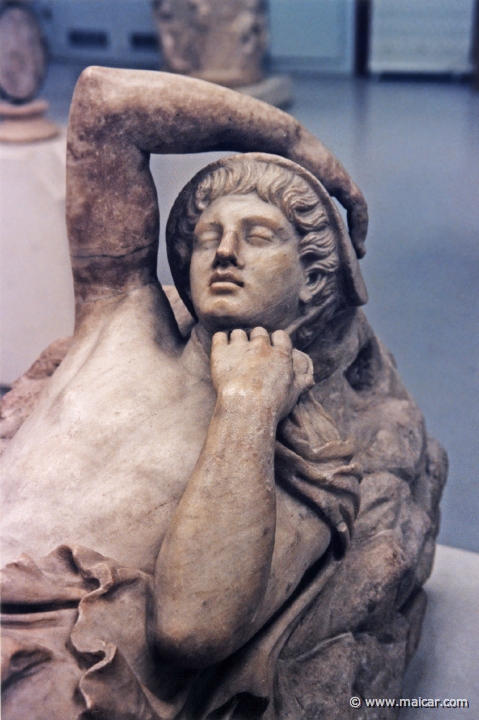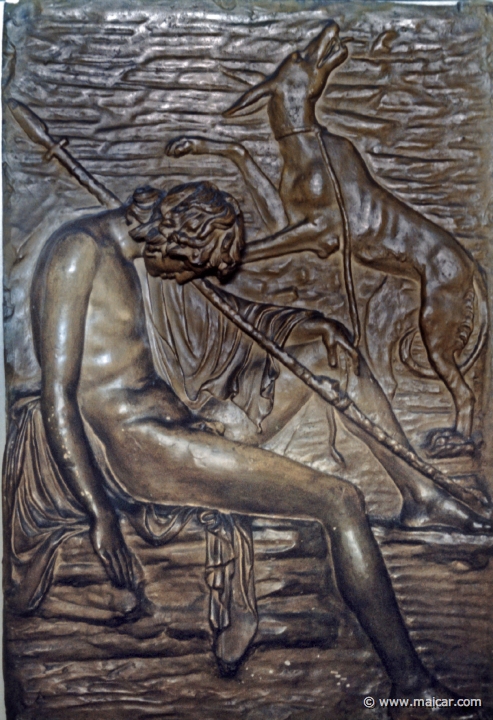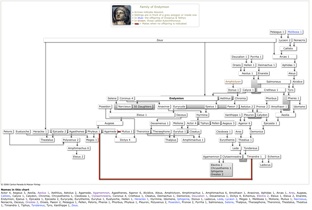Endymion
Ἐνδυμίων |
|
|

|
8018: Endymion sleeping on Mount Latmos. Marble. Probably 2nd century AD. British Museum, London.
|
|
|
|
|

|
7916: Endymion sleeping. Sir John Soane's Museum, London.
|
|
Endymion, the founder of Elis, was loved by Selene, and being allowed
to choose anything he would, he chose to sleep for
ever, remaining deathless and ageless.
King of Elis
The first ruler of the territory of Elis was Aethlius, grandson
of Deucalion 1, the
man who survived the Flood. Either he or else Zeus fathered Endymion, who
led the Aeolians out of Thessaly, and founded the
city of Elis where he ruled as king. Endymion is said to have deposed Clymenus 8 (son of Cardys), a descendant of Heracles 2 who came from Crete to Olympia. Concerning his succession, Endymion conceived
the idea of having his sons running a race at Olympia for the throne which Epeius 1 won.
Endymion and the Moon
Endymion is counted among the most handsome, his
beauty being comparable to that of Adonis, Ganymedes, Hyacinthus 1, Hermaphroditus, Hylas, Chrysippus 2, or to that of his own son Narcissus. That is probable why Selene fell in love with
him and bore him fifty daughters. And then Zeus allowed him to choose any favor, and Endymion chose to sleep for ever, remaining deathless and ageless. Yet others affirm that he led the life of a for
ever sleepless shepherd in Mount Latmos (in Asia
Minor, near Miletus); for they say:
"I believe Selene bathes in the Aonian waves on her
way to Endymion's bed on Latmos, the bed of a
sleepless shepherd." (Nonnus, Dionysiaca 4.238).
And still others assert that not Selene but Hypnos (Sleep) was in
love with Endymion, and
that the god put him to rest with lids wide open,
so that he could gaze upon Endymion's eyes
continually.
Tomb and shrine
But the eternal sleep of death took place either
in Elis, according to the
Eleans who showed Endymion's tomb at the end of the
stadium where the starting-place for the runners
is, or else in Mount Latmos where there was a
shrine dedicated to him.
Punished by Zeus
Now death is not what humans think it to be; for
Endymion, though being deathless, nevertheless
died. Having left this world, he was taken to
heaven by Zeus. But there
the god fooled him by means of a cloud (as he also
fooled Ixion) for having
fallen in love with Hera,
and Endymion was subsequently cast into Hades.
|
| Family |
|
|
|
|
|
| |
|
|
|

|
|
|
-
- Aethlius was the first ruler of Elis. He was
the son either of Zeus and Protogenia 1, or of Aeolus 1, or
of Zeus and Calyce 1. Protogenia 1 is daughter of Deucalion 1 (the man who survived the Flood) and Pyrrha 1.
- Calyce 1 is daughter of Aeolus 1 and
Enarete.
|
|
a) Naiad 1
b) Iphianassa 2
|
Aetolus 2
|
("a)", "b)", etc. = different versions). Aetolus 2 is the eponym of Aetolia, the region in mainland Greece north of the Gulf of Patrae. Aetolus 2 was King of Elis after his brother Epeius 1 was made to flee. He married Pronoe 2 and had two sons: Pleuron and Calydon, after whom the Aetolian cities were called (see also Calydon).
|
|

Selene
|
50 Daughters
|
|
|

Narcissus
|
|
a) Asterodia 2
b) Hyperippe 2
c) Chromia
|
Paeon 2
Epeius 1
Aetolus 2
Eurycyda
|
"a)", "b)", etc. = different versions.
Hyperippe 2 is daughter of Arcas 1, son of Zeus and Callisto.
Chromia is daughter of Itonus 1, son of Amphictyon, himself son of Deucalion 1 (the man
who survived the Flood),
or else AUTOCHTHONOUS.
Paeon 2 went into exile to the region named Paeonia after him, after losing the kingdom of Elis in a race at Olympia.
Epeius 1 won the kingdom through a race at Olympia against his
brothers. He married Anaxiroe, and had by her a
daughter Hyrmina.
Eurycyda consorted with Poseidon, and had a son Eleius 1 by the god.
|
|
|
|
|

|
Genealogical Charts
Names in this chart: Actor 4, Aegeus 3, Aeolia, Aeolus 1, Aethlius, Aetolus 2, Agamede, Agamemnon, Agasthenes, Agenor 6, Alcidice, Aleus, Amphictyon, Amphimachus 1, Amphimachus 6, Amythaon 1, Anaxiroe, Aphidas 1, Arcas 1, Ares, Augeas, Callisto, Calyce 1, Calydon, Chromia, Chrysothemis 1, Cleoboea 1, Clytaemnestra, Coronus 4, Cretheus 1, Cteatus, Deimachus 1, Demonice, Deucalion 1, Dexamenus 1, Dictys 4, Echemus, Electra 2, Eleius 1, Eleius 2, Enarete, Endymion, Epeius 1, Epicasta 1, Epicasta 2, Eurycyda, Eurythemis, Eurytus 1, Eustyoche, Hellen 1, Heracles 1, Hyrmina, Idomene, Iphigenia, Itonus 1, Ladocus, Leda, Lycaon 2, Meges 1, Meliboea 1, Molione, Mulius 1, Narcissus, Nonacris, Oeceus, Orestes 2, Orseis, Paeon 2, Pelasgus 1, Pellen, Peloris, Pheres 1, Phorbus, Phyleus 1, Pleuron, Polyxenus 2, Poseidon, Pronoe 2, Pyrrha 1, Salmoneus, Selene, Thalpius, Theraephone, Theronice, Thestalus, Thestius 1, Timandra 1, Tiphys, Tyndareus, Tyro, Xanthippe 1, Zeus. |
|
|
| Related sections |
|
|
|
Sources
Abbreviations |
Apd.1.7.5-7; Hes.GE.11; Nonn.7.239,
48.581; Pau.5.1.4, 5.8.1, 6.20.7.
|
|
|